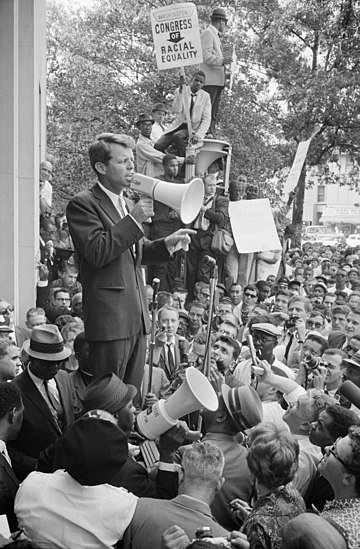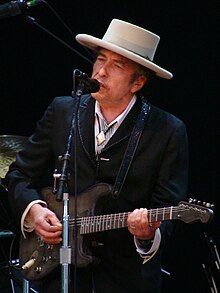Portal:1960s
The 1960s Portal
The 1960s became synonymous with the new, radical, and subversive events and trends of the period. In Africa the 1960s was a period of radical political change as 32 countries gained independence from their European colonial rulers. Some commentators have seen in this era a classical Jungian nightmare cycle, where a rigid culture, unable to contain the demands for greater individual freedom, broke free of the social constraints of the previous age through extreme deviation from the norm. Christopher Booker charts the rise, success, fall/nightmare and explosion in the London scene of the 1960s. However, this alone does not explain the mass nature of the phenomenon. Several nations such as the U.S., France, Germany and Britain turned to the left in the early and mid 1960s. In the United States, John F. Kennedy, a Keynesian and staunch anti-communist, pushed for social reforms. His assassination in 1963 was a stunning shock. Liberal reforms were finally passed under Lyndon B. Johnson including civil rights for African Americans and healthcare for the elderly and the poor. Despite his large-scale Great Society programs, Johnson was increasingly reviled by the New Left at home and abroad. The heavy-handed American role in the Vietnam War outraged student protestors across the globe, as they found peasant rebellion typified by Ho Chi Minh and Che Guevara more appealing. Italy formed its first left-of-center government in March 1962 with a coalition of Christian Democrats, Social Democrats, and moderate Republicans. Socialists joined the ruling block in December 1963. In Britain, the Labour Party gained power in 1964. In Brazil, João Goulart became president after Jânio Quadros resigned. This is a Featured article, which represents some of the best content on English Wikipedia..
The Stonewall riots, also known as the Stonewall uprising, Stonewall rebellion, or simply Stonewall, were a series of protests by members of the LGBTQ community in response to a police raid that began in the early morning hours of June 28, 1969, at the Stonewall Inn in the Greenwich Village neighborhood of Lower Manhattan in New York City. Patrons of the Stonewall, other Village lesbian and gay bars, trans activists and unhoused LGBT individuals fought back when the police became violent. The riots are widely considered the watershed event that transformed the gay liberation movement and the twentieth-century fight for LGBT rights in the United States. As was common for American gay bars at the time, the Stonewall Inn was owned by the Italian-American Mafia. While police raids on gay bars were routine in the 1960s, officers quickly lost control of the situation at the Stonewall Inn on June 28, 1969. Tensions between New York City Police and gay residents of Greenwich Village erupted into more protests the next evening and again several nights later. Within weeks, Village residents organized into activist groups demanding decriminalization of homosexuality. The new activist organizations concentrated on confrontational tactics, and within months three newspapers were established to promote rights for gay men, lesbians and bisexual people. (Full article...)This is a Good article, an article that meets a core set of high editorial standards.
Psycho is a 1960 American horror film produced and directed by Alfred Hitchcock. The screenplay, written by Joseph Stefano, was based on the 1959 novel of the same name by Robert Bloch. The film stars Anthony Perkins, Janet Leigh, Vera Miles, John Gavin, and Martin Balsam. The plot centers on an encounter between on-the-run embezzler Marion Crane (Leigh) and shy motel proprietor Norman Bates (Perkins) and its aftermath, in which a private investigator (Balsam), Marion's lover Sam Loomis (Gavin), and her sister Lila (Miles) investigate her disappearance. Psycho was seen as a departure from Hitchcock's previous film North by Northwest, as it was filmed on a small budget in black-and-white by the crew of his television series Alfred Hitchcock Presents. Initially, the film divided critics due to its controversial subject matter, but audience interest and outstanding box-office returns prompted a major critical re-evaluation. Psycho was nominated for four Academy Awards, including Best Director for Alfred Hitchcock and Best Supporting Actress for Janet Leigh. (Full article...)Selected picture - United States Attorney General Robert F. Kennedy speaking at a civil rights demonstration organized by the Congress of Racial Equality (CORE) on the steps of the Department of Justice building in June 1963. Kennedy's tenure (1961–64) was easily the period of greatest power for the office; no previous officeholder had enjoyed such clear influence on all areas of policy during an administration. As Attorney General, Kennedy pursued a relentless crusade against organized crime and consistently championed civil rights for African Americans, the latter so much so that he commented, in 1962, that it seemed to envelop almost every area of his public and private life.
Did you know -
Related portalsThis is a Featured article, which represents some of the best content on English Wikipedia..
Bob Dylan (legally Robert Dylan; born Robert Allen Zimmerman, May 24, 1941) is an American singer-songwriter. Often considered to be one of the greatest songwriters in history, Dylan has been a major figure in popular culture over his 60-year career. He rose to prominence in the 1960s, when his songs "Blowin' in the Wind" (1963) and "The Times They Are a-Changin'" (1964) became anthems for the civil rights and antiwar movements. Initially modeling his style on Woody Guthrie's folk songs, Robert Johnson's blues, and what he called the "architectural forms" of Hank Williams's country songs, Dylan added increasingly sophisticated lyrical techniques to the folk music of the early 1960s, infusing it "with the intellectualism of classic literature and poetry". His lyrics incorporated political, social, and philosophical influences, defying pop music conventions and appealing to the burgeoning counterculture. Dylan was born and raised in St. Louis County, Minnesota. Following his self-titled debut album of traditional folk songs in 1962, he made his breakthrough with The Freewheelin' Bob Dylan the next year. The album features "Blowin' in the Wind" and "A Hard Rain's a-Gonna Fall" which, like many of his early songs, adapted the tunes and phrasing of older folk songs. He released the politically charged The Times They Are a-Changin' and the more lyrically abstract and introspective Another Side of Bob Dylan in 1964. In 1965 and 1966, Dylan drew controversy among folk purists when he adopted electrically amplified rock instrumentation, and in the space of 15 months recorded three of the most influential rock albums of the 1960s: Bringing It All Back Home, Highway 61 Revisited (both 1965) and Blonde on Blonde (1966). When Dylan made his move from acoustic folk and blues music to rock, the mix became more complex. His six-minute single "Like a Rolling Stone" (1965) expanded commercial and creative boundaries in popular music. (Full article...)This is a Good article, an article that meets a core set of high editorial standards.
Fidel Alejandro Castro Ruz (/ˈkæstroʊ/ KASS-troh, Latin American Spanish: [fiˈðel aleˈxandɾo ˈkastɾo ˈrus]; 13 August 1926 – 25 November 2016) was a Cuban revolutionary and politician who was the leader of Cuba from 1959 to 2008, serving as the prime minister of Cuba from 1959 to 1976 and president from 1976 to 2008. Ideologically a Marxist–Leninist and Cuban nationalist, he also served as the first secretary of the Communist Party of Cuba from 1965 until 2011. Under his administration, Cuba became a one-party communist state; industry and business were nationalized, and socialist reforms were implemented throughout society. Born in Birán, the son of a wealthy Spanish farmer, Castro adopted leftist and anti-imperialist ideas while studying law at the University of Havana. After participating in rebellions against right-wing governments in the Dominican Republic and Colombia, he planned the overthrow of Cuban president Fulgencio Batista, launching a failed attack on the Moncada Barracks in 1953. After a year's imprisonment, Castro travelled to Mexico where he formed a revolutionary group, the 26th of July Movement, with his brother Raúl Castro and Ernesto "Che" Guevara. Returning to Cuba, Castro took a key role in the Cuban Revolution by leading the Movement in a guerrilla war against Batista's forces from the Sierra Maestra. After Batista's overthrow in 1959, Castro assumed military and political power as Cuba's prime minister. The United States came to oppose Castro's government and unsuccessfully attempted to remove him by assassination, economic embargo, and counter-revolution, including the Bay of Pigs Invasion of 1961. Countering these threats, Castro aligned with the Soviet Union and allowed the Soviets to place nuclear weapons in Cuba, resulting in the Cuban Missile Crisis—a defining incident of the Cold War—in 1962. (Full article...)Selected article - Muhammad Ali (/ɑːˈliː/; born Cassius Marcellus Clay Jr.; January 17, 1942 – June 3, 2016) was an American professional boxer and activist. Nicknamed "the Greatest", he is regarded as one of the most significant sports figures of the 20th century and is often regarded as the greatest heavyweight boxer of all time. He held the Ring magazine heavyweight title from 1964 to 1970. He was the undisputed champion from 1974 to 1978 and the WBA and Ring heavyweight champion from 1978 to 1979. In 1999, he was named Sportsman of the Century by Sports Illustrated and the Sports Personality of the Century by the BBC. Born and raised in Louisville, Kentucky, he began training as an amateur boxer at age 12. At 18, he won a gold medal in the light heavyweight division at the 1960 Summer Olympics and turned professional later that year. He converted to Islam after 1961. He won the world heavyweight championship, defeating Sonny Liston in a major upset on February 25, 1964, at age 22. During that year, he denounced his birth name as a "slave name" and formally changed his name to Muhammad Ali. In 1966, Ali refused to be drafted into the military, owing to his religious beliefs and ethical opposition to the Vietnam War, and was found guilty of draft evasion and stripped of his boxing titles. He stayed out of prison while appealing the decision to the Supreme Court, where his conviction was overturned in 1971. He did not fight for nearly four years and lost a period of peak performance as an athlete. Ali's actions as a conscientious objector to the Vietnam War made him an icon for the larger counterculture of the 1960s generation, and he was a very high-profile figure of racial pride for African Americans during the civil rights movement and throughout his career. As a Muslim, Ali was initially affiliated with Elijah Muhammad's Nation of Islam (NOI). He later disavowed the NOI, adhering to Sunni Islam. (Full article...)More Did you know (auto generated)
TopicsCategoriesWikiProjects
Associated WikimediaThe following Wikimedia Foundation sister projects provide more on this subject:
Discover Wikipedia using portals |





























